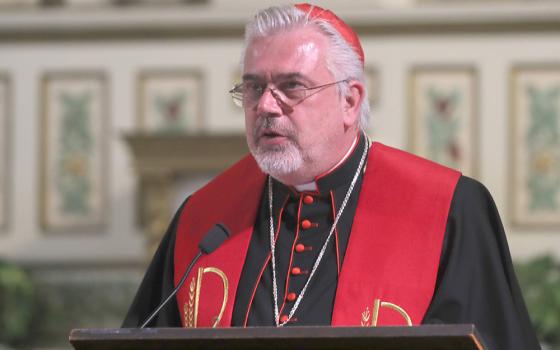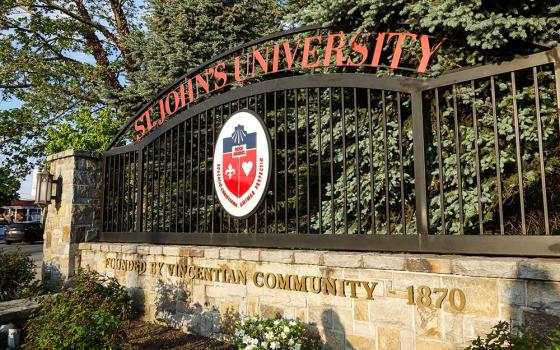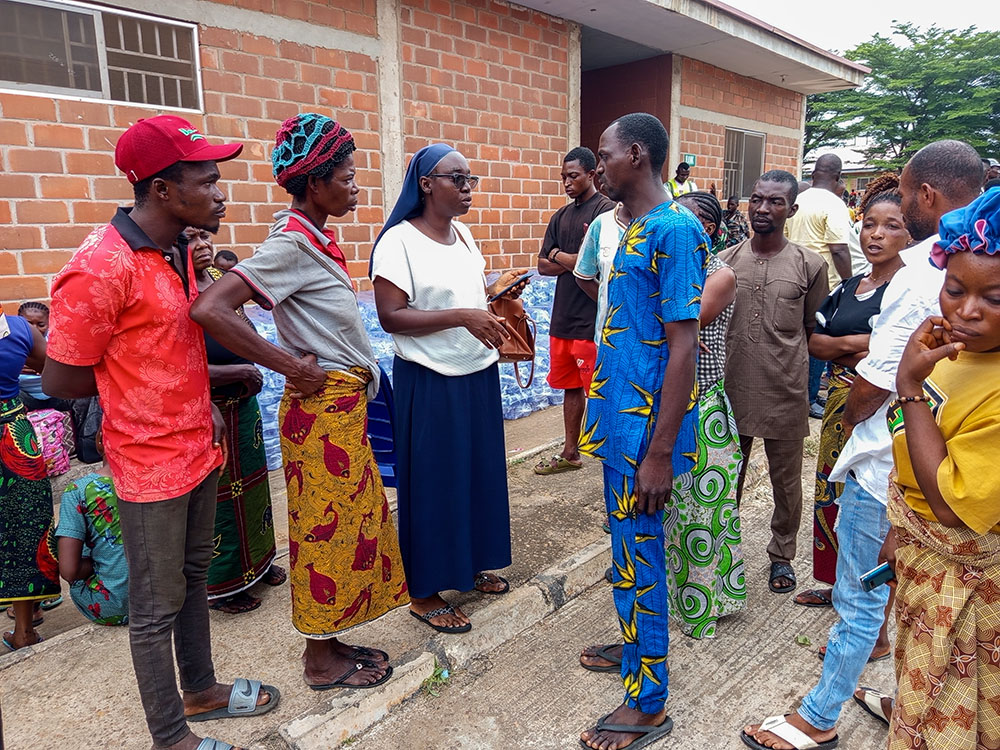
Sr. Mary Ojonugwa Unwuchola interacts with survivors at the International Market Camp for internally displaced people in Makurdi, Benue State, Nigeria. Unwuchola listens to survivors' concerns, prays with them, offers encouragement, and spends time with them, giving them hope for a better tomorrow. (John Chukwu)
A new group of people was moved on a humid Sunday morning to an internally displaced persons camp in Benue State, Nigeria's north-central region. Their grief was still fresh from the violence that had forced them from their ancestral homes.
Some held their rosaries tightly. Others sat quietly with their heads bowed. Tears streamed down the faces of many. Their questions hung heavy in the air, almost unanswerable: Why us? Why again? When will this ever end? Has God deserted us?
For many survivors of Nigeria's recurring farmer-herder clashes, the pain of seeing their loved ones killed, houses razed to ashes, and livelihoods lost is beyond unbearable.
"Once one loses even a single family member, the devastation is overwhelming," said Sr. Mary Ojonugwa Unwuchola, a member of the Missionary Sisters of the Holy Rosary in the Diocese of Makurdi, Benue State. "And for those who have lost more, it is a confusion, a lost hope in humanity."
It is in such dark moments that Unwuchola arrives to console survivors. She does not offer easy answers, but presence, prayer and acts of care.
Her first encounter with internally displaced persons was in 2021, shortly after she arrived in the Makurdi Diocese. A clash in Ikpayongo, an agrarian community about 10 km away, had left families hungry and desperate. Vincentian Fr. Benjamin Akem, the priest serving the area, told her he had been sharing whatever little he had with them. Moved by their plight, Unwuchola sought ways to support them.
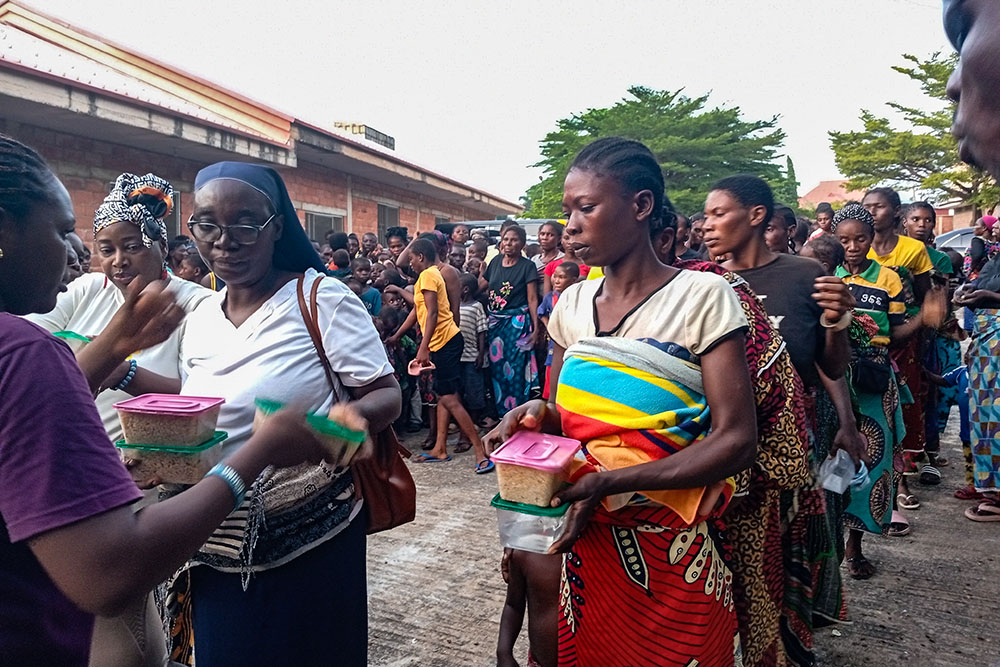
Sr. Mary Ojonugwa Unwuchola distributes cooked rice to survivors of violence at the International Market Camp in Makurdi, Benue State, Nigeria. (John Chukwu)
"We wrote [about] a project to Misean Cara, an organization in Ireland, and they supported it," she recalled. "We said these people needed food because they had suffered an intercommunal clash."
With that success, the diocese connected her to Daudu Camp 1, home to survivors of farmer-herder violence. She later secured support from Aid to the Church in Need, which enabled food distribution, skills training and provided other assistance. From then on, she has not looked back in caring for the material and spiritual needs of the displaced.
For Unwuchola, this Christlike care is practical yet quietly transformative, drawing survivors back to their faith after deadly attacks left it shaken.
For more than a decade, Benue has endured widespread killings, destruction of property, sexual violence and other atrocities linked to farmer-herder clashes. Today, the state stands as a major hotspot for humanitarian crises in Nigeria's North Central region. The killings have left thousands of families displaced, farmlands abandoned and communities soaked in fear.
According to Amnesty International, since 2023, at least 6,896 people have been killed in Benue due to violence, while more than 450,000 have been displaced. The crisis involves multiple actors: armed herders, complicit state actors, criminal syndicates and ineffective law enforcement agencies.
Advertisement
Its roots lie in cattle rustling, disputes over land, the collapse of communal grazing agreements, contamination of water sources by cattle, and the absence of a well-enforced national policy on farmer-herder relations.
An attack on Yelwata, a largely agrarian community, claimed the lives of an estimated 200 people in June. The attack underscored the worsening scale of violence in the state. Two months earlier, in April, coordinated assaults on several villages, including Tse Shawa, Tyuluv and parts of Logo, left scores of residents dead and communities devastated.
For survivors of farmer-herder violence in Benue, the pain of losing their loved ones, houses or livelihoods runs deep. It shakes their faith and leaves them questioning God's presence in their suffering. In these trying times, Catholic sisters step in to help rebuild spiritual lives that violence has left fragile.
Unwuchola explained that survivors often arrive at camps devastated and lost. They ask why evil persists and when it will end. The sisters console them by acknowledging their pain yet pointing to Christ's own suffering as a source of solidarity.
"Attending Mass and praying is a sign of running to God," Unwuchola said. "They unite their suffering at that particular point in time to the suffering of Christ." She emphasized that uniting their pain in Christ's wounds gives them hope for spiritual renewal and healing.
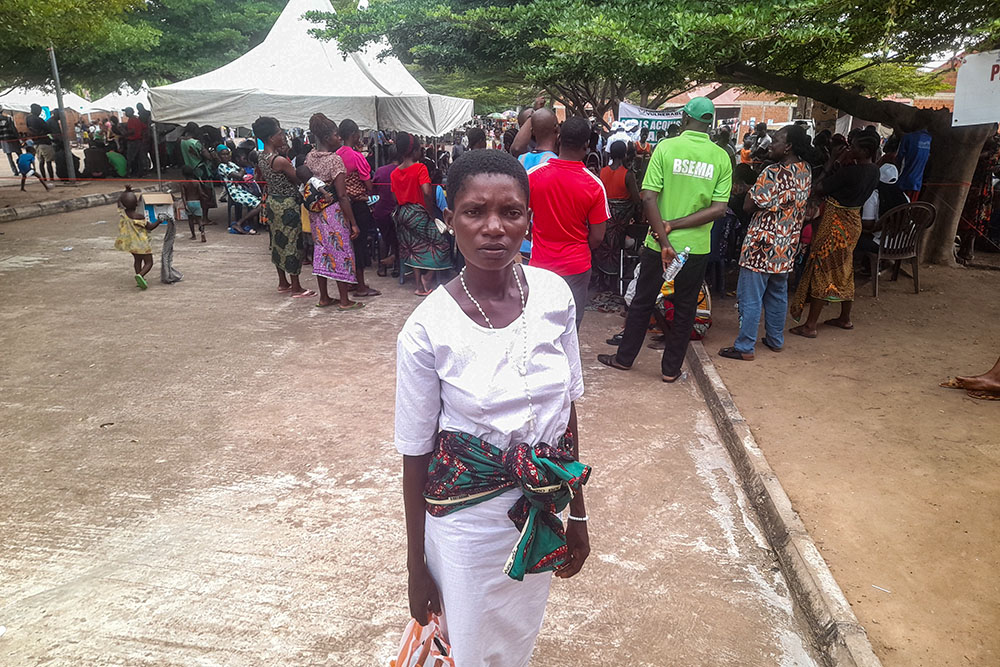
Member Matthew at the International Market Camp in Makurdi, Benue State, Nigeria. Matthew, who was widowed and displaced in an attack, said, "I stopped going to church when the thing happened. However, the sisters have helped me to rebuild my spiritual life." (John Chukwu)
Sr. Onyinyechukwu Anike, also a Missionary Sister of the Holy Rosary, told Global Sisters Report that presence and prayer remain at the core of their mission.
"When we go there, the survivors come to me. We remind them that God loves them, even in that situation," she said.
The survivors often feel abandoned and doubt God's existence, but the sisters counter despair with encouragement, prayer and words of hope.
"We pray for them. We organize special prayers for God's intervention on the situation of the people at the IDP camps and for Benue State," Anike said. "We give them words of encouragement, assuring them that God still cares for them, and that God is aware of what is happening, and has plans for them."
This ministry of presence and prayer is deep and practical. After armed herders, identified by many Benue locals as Fulani militias, attacked Yelwata on the night of June 13 into the early hours of June 14, 2025, countless families were forced into displacement. The sisters had only a single bag of rice left from a previous project.
"We [had] planned to cook it the next day," Unwuchola recalled. "But the people pleaded, 'Bring it today.' So, we cooked it immediately and delivered it that same day." For the displaced, the food was more than sustenance. It was proof that the church has not abandoned them.
Beyond the immediate relief, the sisters provide long-term support. They have enrolled displaced children in schools, secured scholarships, and trained more than 50 youths in skills such as tailoring, shoemaking and laundry, and equipped them with kits to begin new lives.
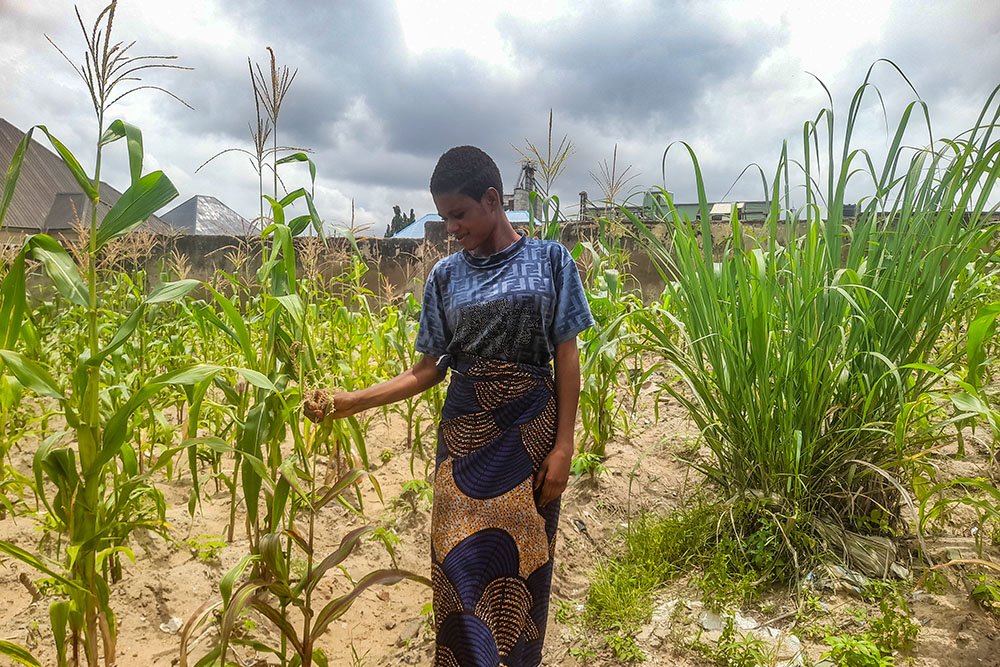
Msendoo Terwase inspects a maize plant at a farm in the Ichwa camp for internally displaced people in Benue State, Nigeria. Terwase told Global Sisters Report, "The words of encouragement from the sisters have helped me so far." (John Chukwu)
Anike shared the story of a young girl orphaned by violence. They took her in, enrolled her in school and gently taught her to pray again. "Being with us, we tried to build her spiritual life. We tried to make her love and trust God again. She knows how to pray now and interpret her situation in the light of the will of God."
Many survivors of Benue's violence say the sisters' efforts have restored their faith. At the International Market Camp, Member Matthew, who was widowed and displaced, said, "I stopped going to church when the thing happened. However, the sisters have helped me to rebuild my spiritual life."
Msendoo Terwase, who stays at the Ichwa camp in Benue State, told GSR that she lost four relatives. "The words of encouragement from the sisters have helped me so far," she said.
David Ukeyima from Yelwata lost his wife and three children. After the attack, his faith collapsed. "The word of God the Catholic sisters preached restored my faith," he said.
Asagh Peter, a humanitarian, affirmed that internally displaced persons have been through so much. Speaking on the sisters' effort, Peter said: "The sisters have brought worship centers to the IDPs. Some of them have been prayed for by the sisters, helping them to regain their trust in God."
Unwuchola affirmed that internally displaced people who initially struggled with their faith have since reconnected with God. "I never saw any of them reject their faith after we spent time with them," she said.





